Highlights from Past Years at the AAR-SBL Conference
- A Conversation about Starting Conversations about Teaching (2016)
In celebration of 20 years of supporting teachers of theology and religion, the Wabash Center hosted this conversation panel of faculty who have participated in Wabash workshops and are now leading projects to promote reflection on teaching at their own institutions. We started with a small panel conversation about the challenges and effective strategies for supporting teachers and how one helps them to critically reflect on their teaching practice, and then enlarged the conversation to everyone in the room. Panelists: Thomas Pearson (Wabash Center), Brooke Lester (Garrett-Evangelical Theological Seminary), Jocelyn McWhirter (Albion College) , Kristi Upson-Saia (Occidental College)
- Graduate Student Lunch” Teach with Confidence: Insights and Advice (2016)
Graduate students joined us for lunch and an interactive presentation about teaching in higher education. Panelists from a variety of institutional types and disciplines will shared reflections on such matters as:
How does the institution at which you work shape your teaching? Our panelists commented on such topics as teaching undergraduate vs. graduate students; teaching in a public vs. a denominational setting; teaching online vs. in a classroom; and teaching outside your area of expertise.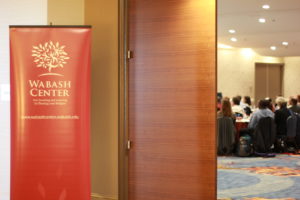
How do the needs and concerns of your students shape your teaching? Our panelists described how they acknowledge such realities as diversity in the classroom; power dynamics in the classroom; and student issues in and beyond the classroom.
How do course mechanics and methods shape your teaching? Our panelists offered advice on such “nuts and bolts” as constructing a syllabus, crafting assignments, and conducting assessment; integrating student evaluation; and the pros and cons of teaching techniques (lectures, discussions, projects, technology, etc.).
How does who you are shape your teaching? Our panelists discussed how their commitments (e.g., religious, personal, and political) and qualities (e.g., personality, gender, race) influence how they teach. Dealing with “imposter syndrome” will receive special notice!
Panelists: Tamara Lewis (Perkins School of Theology, Southern Methodist University), Jeremy Posadas (Austin College), Robert Rivera (St. John’s University, New York), Mary Stimming (Wabash Center)
- Pre-Conference Workshop: “Teaching for Civic Engagement in Religious and Theological Studies” (2016)
Few topics excite greater interest among academics and their many critics than the public, civic purpose of contemporary higher education. But what counts as civic engagement in the university classroom? How do I design effective civic engagement assignments? And what distinctive resources do the disciplines of religious studies and theology have to offer this task? In this 5-hour workshop, participants had the opportunity to share expertise, to learn how and why to adopt these sorts of pedagogies, to discover new strategies and heuristic frameworks, and to reflect on issues of accountability and assessment. We started with buffet lunch at noon and concluded with a reception for participants. Workshop leaders: Reid Locklin (University of Toronto) and Elizabeth Corrie (Candler School of Theology). - Pre-Conference Workshop for ATSI, FTE, HTI and NAIITS Doctoral Students on Teaching and Learning (2015)
A gathering of doctoral students associated with ATSI, FTE, HTI, and NAIITS in their final year of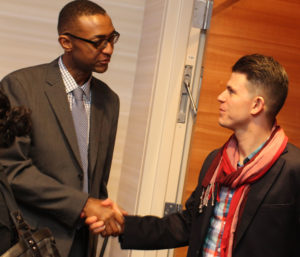 studies or at the dissertation writing stage to discuss particular issues about teaching and learning such as:
What do you want your teaching to do in the world?
Community teaching and learning
. Vocation and institutional contexts. Evaluation and assessment as ways for celebration and reflection on mutual growth.
Collaboration in the first year(s) of teaching.
Gifts we leave one another. Leadership Team:
Elizabeth Conde-Frazier, (Esperanza College),
Terry LeBlanc (NAIITS),
Tat-siong Benny Liew (College of the Holy Cross),
Stephen Ray (Garrett-Evangelical Theological Seminary
).
studies or at the dissertation writing stage to discuss particular issues about teaching and learning such as:
What do you want your teaching to do in the world?
Community teaching and learning
. Vocation and institutional contexts. Evaluation and assessment as ways for celebration and reflection on mutual growth.
Collaboration in the first year(s) of teaching.
Gifts we leave one another. Leadership Team:
Elizabeth Conde-Frazier, (Esperanza College),
Terry LeBlanc (NAIITS),
Tat-siong Benny Liew (College of the Holy Cross),
Stephen Ray (Garrett-Evangelical Theological Seminary
). - Workshop – Teaching for a Culturally Diverse and Racially Just World (2014)
This 90-minute mini-workshop explored specific dimensions of the issues in Teaching for a Culturally Diverse and Racially Just World (edited by Eleazar Fernandez) — as they pertain to teaching practice and leveraging institutional change. Issues explored involved a range of topics, including:
• When Subjects Matter: The Bodies We Teach By
• What Shall We Teach? The Content of Theological Education
• Thoughts on Curriculum as Formational Praxis for Faculty, Students, and their Communities
• Teaching Disruptively: Pedagogical Strategies to Teaching Cultural Diversity and Race
Workshop Leaders: Eleazar Fernandez (United Theological Seminary of Twin Cities), Elizabeth Conde Frazier (Esperanza College), Willie James Jennings (Duke Divinity School), Boyung Lee (Pacific School of Religion), and Mai-Anh Le Tran (Eden Theological Seminary) - Thinking About Writing About Teaching (2015)
Participants in this interactive and hands-on session thought together about how and why various types of writing about teaching become valuable for authors as well as readers who are reflecting on their teaching and student learning. Participants were led through a hands-on, small group interactive process to reflect on their teaching practice and begin to “workshop” an idea for a writing project about teaching. How can writing and reading about teaching support your reflective teaching practice? Leadership: Eugene Gallagher (Connecticut College), Martha Stortz (Augsburg College), and Thomas Pearson (Wabash Center, Editor of Teaching Theology and Religion) - Pre-Conference Workshop: Teaching Visual Arts in Religious Studies and Theology Classrooms (2014)
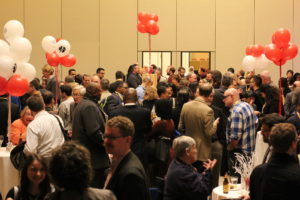 This workshop provided faculty with various strategies and methods for teaching the visual arts in religious studies and theology classrooms. Participants explore da range of ways by which specific pedagogical methods can help students engage the visual arts as loci for the study of religious studies, theology, ethics, bible, etc. Specific attention was given to the following pedagogical methods: a dialogical method that sees artist, art, and the viewer (theologian, ethicists, whomever) in conversation, drawing on material from other disciplines; a method that considers the role of material evidence, which means beginning with methodological questions in order to engage students (and colleagues no less) in the definition of evidence in historical and cultural analysis; and a method that attends to the ethics of observation as part of the hermeneutics of visual cultures, including the viewer’s gaze.
This workshop provided faculty with various strategies and methods for teaching the visual arts in religious studies and theology classrooms. Participants explore da range of ways by which specific pedagogical methods can help students engage the visual arts as loci for the study of religious studies, theology, ethics, bible, etc. Specific attention was given to the following pedagogical methods: a dialogical method that sees artist, art, and the viewer (theologian, ethicists, whomever) in conversation, drawing on material from other disciplines; a method that considers the role of material evidence, which means beginning with methodological questions in order to engage students (and colleagues no less) in the definition of evidence in historical and cultural analysis; and a method that attends to the ethics of observation as part of the hermeneutics of visual cultures, including the viewer’s gaze.
Workshop participants explored both meta-level questions about engaging the visual arts and specific strategies for teaching visual arts in contemporary higher educational contexts through a range of questions. The pre-meeting workshop included mini-lectures, plenary conversations, and small group work. In addition, participants were exposed to materials for study and teaching including: methods of visual analysis, ethics of inquiry, exhibition practices, subject areas (Christianity, Buddhism, Islam, etc.), theories of visual culture, and so on.
Sample Questions that were Explored:
• How do religions happen visually and how do we study them?
• How do faculty help students identify various intersections between religion and visuality/visual culture, and then see how they might be studied?
• How do teachers effectively attend to the ethics of observation and teach students concerning the ethics of observation?
• How do teachers effectively teach theology, bible, religious studies, etc. through the visual arts?
• By what means do teachers help students effectively engage visual arts as places to begin the study of various disciplinary topics rather than as illustrations for particular points in those disciplines?
• How do contextual readings of visual art aid teaching and learning in theology and religion?
• What do faculty need to know about visual art historical methods, visual textual methods, cultural studies methods, etc. in order to teach visual arts in religious studies and theology classrooms?
• What specific teaching methods help students with little experience in engaging visual arts and who may feel intimidated by invitations to respond to discussing visual art as religious or theological texts?
• How do teachers help students engage the multi-variegated textures associated with both the study of the visual arts and religious studies, and theology?
Co-sponsored with The Society for the Arts in Religious and Theological Studies
Workshop Leaders: David Morgan (Duke University),
Vivian-Lee Nyitray (Prospect College, China), Wilson Yates (United Theological Seminary of the Twin Cities),
Paul Myhre (Wabash Center; President, SARTS)
- Pre-Conference Workshop: Teaching with Social Media (2013)
The Wabash Center offered a four hour pre-meeting workshop on Friday, November 22, from 1:00 – 5:00 pm on the topic of Teaching with Social Media. The structure and design for the workshop consisted of three distinct movements. First, Mary Hess (Luther Seminary) facilitated a one-hour session on the topic “The New Culture of Learning” that is emerging in digitally mediated contexts in relation to teaching religious studies and theology. Second, Robert Williamson, Jr. (Hendrix College) facilitated a one-hour session on “Using Twitter in Teaching and Learning.” Finally, Roger Nam (George Fox Evangelical Seminary) facilitated a one-hour session on “Blogs and Effective Teaching: Reimaging our Physical and Symbolic Classrooms.”
Resources
• Wabash Center Resources
• Digital Tech and Theological Education
• Tomorrow’s Professor
• MacArthur Foundation Digital Learning
• Teaching with Twitter Stephanie Hedge
• A Framework for Teaching with Twitter Mark Sample
• Using Twitter to Improve Student Learning Robert Williamson Jr.
• “Using Twitter to Teach Reader-Oriented Biblical Interpretation.” Robert Williamson Jr. Teaching Theology & Religion 16, no. 3 (2013): 274-286.
• A New Culture of Learning. Douglas Thomas and John Seely Brown. Createspace, 2011.
• Engaging Technology in Theological Education: All That We Can’t Leave Behind. Mary E. Hess. Rowman and Littlefield Publishers, 2005
• Hanging out, Messing Around, Geeking Out. Mizuko Ito, et al. MIT Press, 2010.
• Teaching Reflectively in Theological Contexts: Promises and Contradictions. Mary E. Hess and Stephen D. Brookfield, editors. Krieger, 2008.
• The Heart of Higher Education. Parker Palmer, Arthur Zajonc, Megan Scribner and Mark Nepo. Jossey-Bass, 2010.
• Social Media in Higher Education: Teaching Web 2.0. Monica Patrut and Bogdan Patrut, editors. IGI Global, 2013.
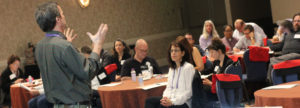
Send ideas for possible sessions to:
Dr. Paul Myhre
(myhrep@wabash.edu)
Associate Director, Wabash Center
Also of Interest: Latest Blog Posts
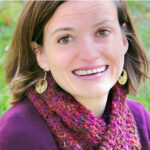 The Challenges of Teaching and Learning about Israel/Palestine after October 7 - Twelve weeks ago, there was a class, who took on an enormous task, of studying the present and the past, Israel and Palestine. Dr. Breed taught them the history, so […]
The Challenges of Teaching and Learning about Israel/Palestine after October 7 - Twelve weeks ago, there was a class, who took on an enormous task, of studying the present and the past, Israel and Palestine. Dr. Breed taught them the history, so […]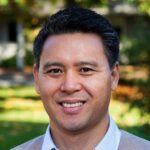 The Best Thing Anyone Ever Told Me in Graduate School - The best thing anyone ever told me in graduate school rings as clear and true today as it did then. It was during the first year of my doctoral work […]
The Best Thing Anyone Ever Told Me in Graduate School - The best thing anyone ever told me in graduate school rings as clear and true today as it did then. It was during the first year of my doctoral work […]